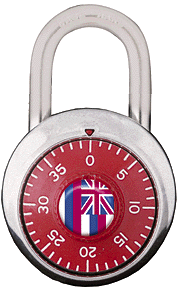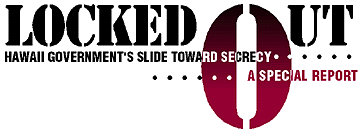

The failure is due to rapid changes in communication technology and the Legislature's lack of interest in providing more on-line information.

In making the switch from a state-operated electronic bulletin board to an expanding Web site on the Internet, the state gave more access to its information and saved about $16,000 a month in computer costs.
Since then, however, little has changed with ACCESS, while state after state now offers more and more public information over the Internet, which opens government to anyone in the world with a computer and an Internet connection.
In comparison, Hawaii's system still requires a call to a Hawaii number and then working down a puzzling maze of categories of information.
On-line community activist and Web page system designer Scott Crawford says he has almost given up on FYI, on which ACCESS is located, because the system is so slow.
"In the past I have found some good information there, but in general there has been very little result for the money spent.
"The technology can be used effectively to open the democratic process, but FYI was primitive when I used it last," he said.
"It is the searchable databases that are really useful, and the technology to do it is out there," he said.
At least 11 states offer legislators' electronic mail addresses on legislative Internet sites so citizens can send messages directly to the lawmakers. Only a handful of Hawaii legislators offer the public that opportunity.
In 1992, freshman California legislator Debra Bowen shocked officials when she unlocked that legislature's computer files, giving computer users instant access to information about bills and voting records.
Hawaii still doesn't permit the public to easily compile voting record lists.
At the beginning, Bowen turned to Hawaii for help.
"(Hawaii state Sen.) Carol Fukunaga was one of my inspirations," she said. Bowen's staff convinced her to meet with Fukunaga, who, along with fellow legislator David Ige, had spearheaded the move to open legislative information through the ACCESS system.
But the system offers essentially the same services it did in 1990, while the California system is surging ahead.
Last year the California service was expanded to allow citizens to "subscribe" to pieces of legislation. When a bill a citizen has subscribed to is changed or a new hearing is scheduled or there is any development on the bill that the state's computers track, the subscriber is sent an e-mail notification.
In Hawaii, legislators have a similar feature available to them, but it is off-limits to the public.
Sen. David Ige acknowledges that it doesn't look encouraging for citizens who want easier access to information.
"We are interested in moving to the Internet, and we are asking the speaker and the Senate president," he said. "But most preliminary discussions said it would cost us a million dollars."
California converted its internal electronic system to a public Internet system with an $80,000 computer system.
Ige says the present Hawaii system doesn't help the public enough.
The Star-Bulletin couldn't find any legislators who actually had tried to use the ACCESS system that is available to the public. So while legislators highlight the system in their campaign brochures, few, if any, know if it works.
"The real problem is people aren't used to sharing this detailed information with the public," says Rep. Jim Shon.